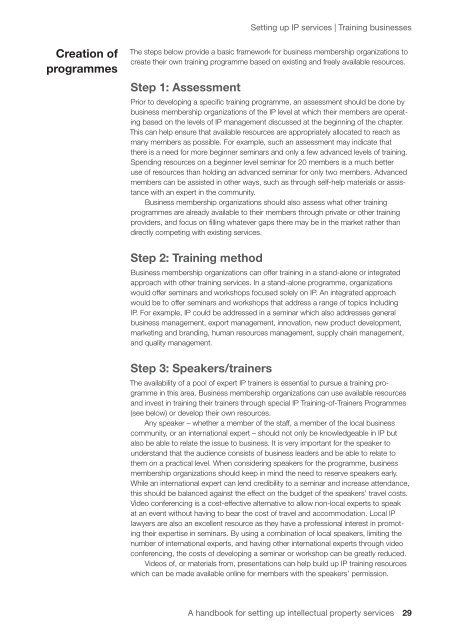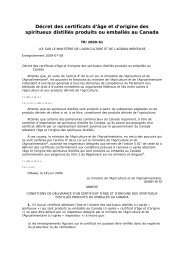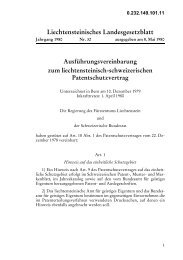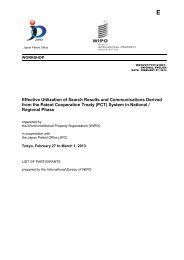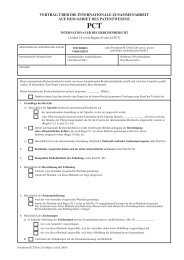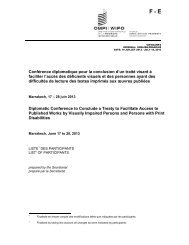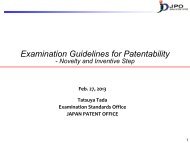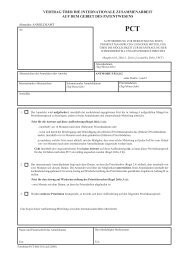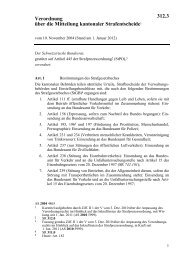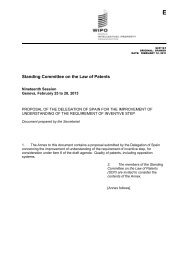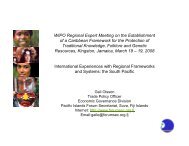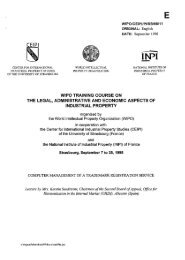Making intellectual property work for business - World Intellectual ...
Making intellectual property work for business - World Intellectual ...
Making intellectual property work for business - World Intellectual ...
You also want an ePaper? Increase the reach of your titles
YUMPU automatically turns print PDFs into web optimized ePapers that Google loves.
Creation of<br />
programmes<br />
Setting up IP services | Training <strong>business</strong>es<br />
The steps below provide a basic frame<strong>work</strong> <strong>for</strong> <strong>business</strong> membership organizations to<br />
create their own training programme based on existing and freely available resources.<br />
Step 1: Assessment<br />
Prior to developing a specific training programme, an assessment should be done by<br />
<strong>business</strong> membership organizations of the IP level at which their members are operating<br />
based on the levels of IP management discussed at the beginning of the chapter.<br />
This can help ensure that available resources are appropriately allocated to reach as<br />
many members as possible. For example, such an assessment may indicate that<br />
there is a need <strong>for</strong> more beginner seminars and only a few advanced levels of training.<br />
Spending resources on a beginner level seminar <strong>for</strong> 20 members is a much better<br />
use of resources than holding an advanced seminar <strong>for</strong> only two members. Advanced<br />
members can be assisted in other ways, such as through self-help materials or assistance<br />
with an expert in the community.<br />
Business membership organizations should also assess what other training<br />
programmes are already available to their members through private or other training<br />
providers, and focus on filling whatever gaps there may be in the market rather than<br />
directly competing with existing services.<br />
Step 2: Training method<br />
Business membership organizations can offer training in a stand-alone or integrated<br />
approach with other training services. In a stand-alone programme, organizations<br />
would offer seminars and <strong>work</strong>shops focused solely on IP. An integrated approach<br />
would be to offer seminars and <strong>work</strong>shops that address a range of topics including<br />
IP. For example, IP could be addressed in a seminar which also addresses general<br />
<strong>business</strong> management, export management, innovation, new product development,<br />
marketing and branding, human resources management, supply chain management,<br />
and quality management.<br />
Step 3: Speakers/trainers<br />
The availability of a pool of expert IP trainers is essential to pursue a training programme<br />
in this area. Business membership organizations can use available resources<br />
and invest in training their trainers through special IP Training-of-Trainers Programmes<br />
(see below) or develop their own resources.<br />
Any speaker – whether a member of the staff, a member of the local <strong>business</strong><br />
community, or an international expert – should not only be knowledgeable in IP but<br />
also be able to relate the issue to <strong>business</strong>. It is very important <strong>for</strong> the speaker to<br />
understand that the audience consists of <strong>business</strong> leaders and be able to relate to<br />
them on a practical level. When considering speakers <strong>for</strong> the programme, <strong>business</strong><br />
membership organizations should keep in mind the need to reserve speakers early.<br />
While an international expert can lend credibility to a seminar and increase attendance,<br />
this should be balanced against the effect on the budget of the speakers’ travel costs.<br />
Video conferencing is a cost-effective alternative to allow non-local experts to speak<br />
at an event without having to bear the cost of travel and accommodation. Local IP<br />
lawyers are also an excellent resource as they have a professional interest in promoting<br />
their expertise in seminars. By using a combination of local speakers, limiting the<br />
number of international experts, and having other international experts through video<br />
conferencing, the costs of developing a seminar or <strong>work</strong>shop can be greatly reduced.<br />
Videos of, or materials from, presentations can help build up IP training resources<br />
which can be made available online <strong>for</strong> members with the speakers’ permission.<br />
A handbook <strong>for</strong> setting up <strong>intellectual</strong> <strong>property</strong> services 29


